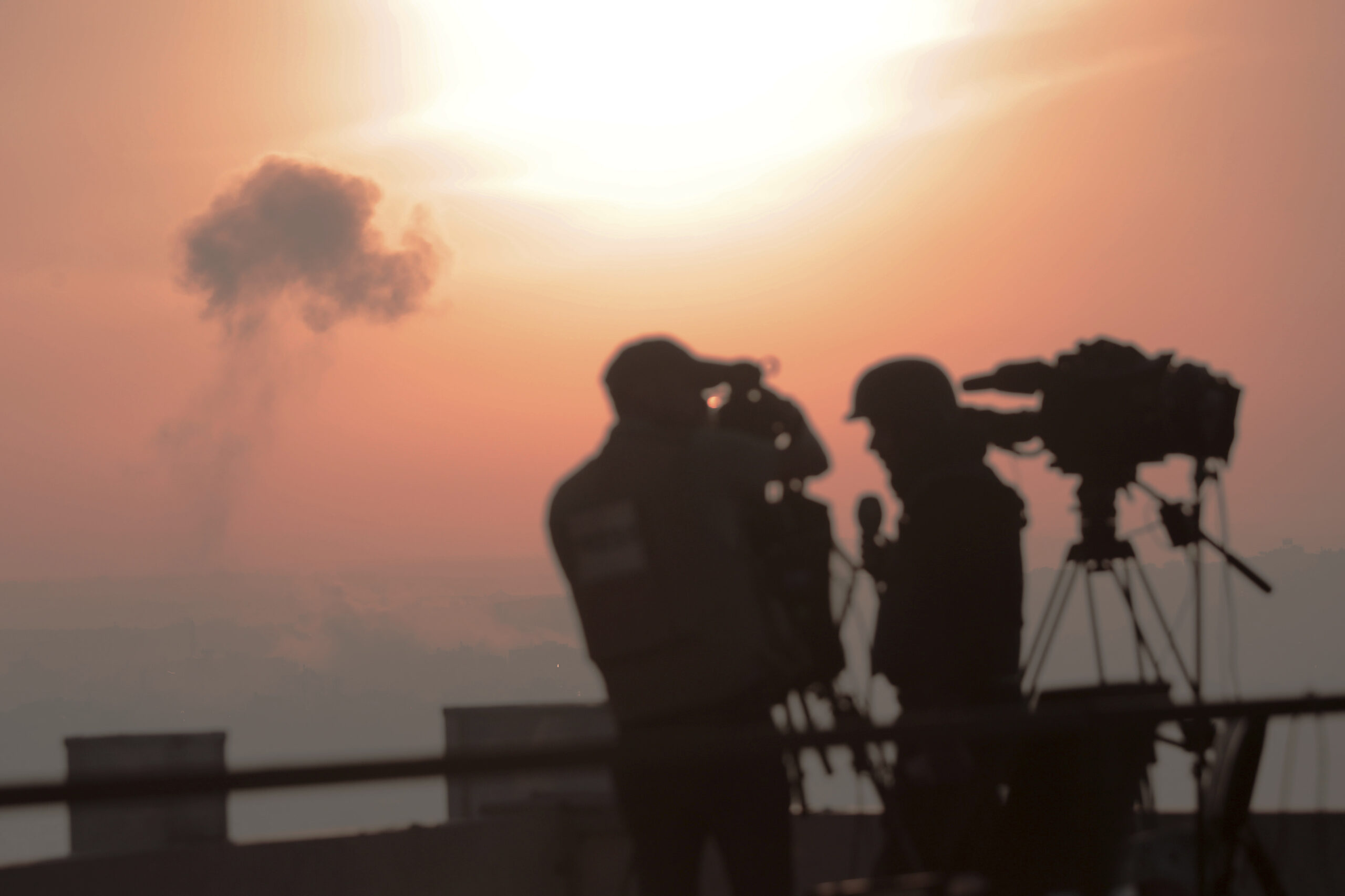‘I’ve Had to Change My Way of Living’: Reporters Covering Israel-Hamas War Face Violent Threats, Harassment

Momen Faiz/NurPhoto via AP
The Israel-Hamas war has been a particularly perilous one for journalists. Not only has the conflict been the deadliest in decades for reporters on the ground, but there has also been a surge in death threats and harassment aimed at those covering the story across the globe.
On Monday, the National Press Club issued a statement denouncing violent threats against Muslim and Jewish reporters. “We strongly condemn the rise in hateful rhetoric, threats and calls for violence against journalists,” the statement read. It cited, among others, the case of Youmna ElSayed, an Al Jazeera correspondent who said she received a threatening phone call warning her and her family to leave their home.
“Journalism is not a crime,” the group said. “We urge relevant authorities to take these threats seriously, to investigate them fully, and to act when necessary to ensure the safety of all journalists.”
On the ground in the region, journalists have faced unimaginable violence. The Committee to Protect Journalists estimated that 37 journalists have been killed since the Hamas terror attack of Oct. 7 prompted Israel to launch a bombing campaign of the Gaza Strip. The toll on journalists’ families has been even greater. In one heart-wrenching scene that played out live on air, the Gaza bureau chief for Al Jazeera found out his wife and two children had been killed in an Israeli airstrike while reporting from an overrun hospital.
But even outside of Gaza, the climate of threats and harassment has been overwhelming for many journalists, particularly women. Mediaite spoke with four women in the business who said they have fielded a barrage of vicious threats over their coverage of the war.
“I have been threatened with rape, told on numerous occasions that the victims [of Oct. 7] deserved it, or that it didn’t happen,” Rolene Marks, a freelance journalist based in Modi’in, Israel, told Mediaite.
“The rape threat has been most prevalent for me,” she added.
Marks provided Mediaite with screenshots of the threats she has received, most of which have been made on the social media platform X, formerly Twitter.
“I will look for you among all the prisoners and take you to me for sexual pleasure,” read one message.“I will give you some children like you killed in Gaza.”
Marks said she did not alert local police about the messages as they were made by anonymous social media accounts. X, she said, did not do anything to tamp down on the threats.
Anti-Semitic threats have surged since the Oct. 7 attack by Hamas, according to the Anti-Defamation League (ADL). X has faced criticism for serving as a platform rife with misinformation and violent rhetoric. Soon after the attack, X said it removed “hundreds” of Hamas-linked accounts from the platform.
Still, journalists who spoke with Mediaite said they are facing an unprecedented level of vitriol.
“I don’t think anything was done,” Marks said. “I shared the threat so that people could see for themselves the type of threats and invective aimed at Jewish journalists and often toward women.”
“Without a doubt I was threatened because I am Jewish, a female journalist,” she said. “Supporters of Hamas feel emboldened to make rape threats to intimidate Jewish women given that many women were raped on October 7th.”
Emily Schrader, an American-Israeli journalist and social activist based in Tel Aviv, said she too has been sent sexually graphic and anti-Semitic messages.
One email sent to Schrader read: “Go fuck yourself dirty jew i hope u burn in hell. Emily, you skunk I hope yourself and all your beloved ones get burnt and found in pieces like gaza kids.’
“In my case, I am threatened because I am a feminist, journalist, and Zionist in the public eye,” Schrader said. “I stand for everything the Islamic Republic of Iran stands against, and thus I am a target.”
“The harassment of women like me on social media is a tactic intended to silence us,” she continued. “It’s a way of intimidating and bullying people, especially women, into shutting up, but I’m not going to give in to their threats.”
Although Schrader remains steadfast in her commitment to covering the Israel-Hamas war, she is aware that her safety might be in jeopardy doing so.
“Absolutely my safety is at risk reporting on the war,” she said. “I’ve had to change my way of living due to threats. I have to be extremely careful about where I travel and when, and I cannot upload things in real time that give away my location.”
Saba Eitizaz, a journalist at the Toronto Star, said she has faced online hate for several years because of her reporting — so much so that the police are investigating the threats directed at her. She said those threats surged after the Oct. 7 attack.
“I have received a series of emails with horrific, vile, Islamophobic abuse and death threats telling me to shut up or leave Canada, one of them describing in graphic specific and minute detail about just how I will be beaten to a pulp if I don’t ‘shut the fuck up, stay safe and stay home forever,’” she told Mediaite.
“My newsroom leadership is aware and trying their best to provide support internally and externally,” she said. “I believe I’m targeted because of who I am, my identity, the colour of my skin and my work. I’m a brown Muslim woman journalist who has also been vocal on social media tackling disinformation and talking about the normalization of mass violence and collective punishment by the Israeli government on innocent civilians in Gaza.”
Eitizaz said such online hate “leads to violence.”
“Words can be deployed as weapons, it leads to digital violence, and it never takes long before the online hate seeps into someone’s real life, with tragic results,” she said.
Another reporter based in the United States who asked to remain anonymous given the climate told Mediaite that “never in my life experienced this level of hostility, merely for writing about or posting facts about Hamas’s massacre. It’s almost as if people don’t even want to admit there was a horrific terror attack on civilians.”
The reporter said they have been in contact with local enforcement regarding the threats they have received.
“I am staying as vigilant as possible,” they said, “No one should live in fear in the United States in the year 2023 just for doing his or her job.”
New: The Mediaite One-Sheet Newsletter
Your daily summary and analysis of what the many, many media newsletters are saying and reporting. Subscribe now!






Comments
↓ Scroll down for comments ↓